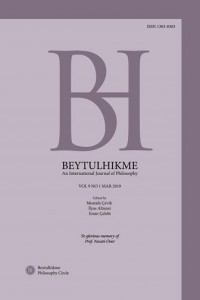Öz
Kaynakça
- Aristotle (1959). Politics. (Trans. H. Rackham). London: William Heinemann Ltd.
- Huard, R. (2007). Plato’s Political Philosophy: The Cave. New York: Algora Publishing.
- Likhovski, A. (1997). "Tyranny" in Nineteenth-Century American Legal Discourse: A Rhetorical Analysis. The Journal of Interdisciplinary History, 28 (2), 205-223.
- Logan, M. (1978). Rhetorical Analysis: Towards a Tropology of Reading. New Literary History, 9 (3), 619-625.
- Plato (1997). Complete Works. (Ed. J. M. Cooper). Indianapolis: Hackett Publishing Company.
- Russell, D. C. (2005). Plato on Pleasure and the Good Life. New York: Oxford University Press.
- Weiss, R. (1998). Socrates Dissatisfied: An Analysis of Plato's 'Crito'. New York & Oxford: Oxford University Press.
Öz
This study analyses Plato’s work Crito with the rhetoric analysis method. Plato’s work Crito is one of his most important works of political philosophy. In this work, Plato develops the key qualities of his own political philosophy. Inspired by the fact that Socrates does not escape the capital punishment, he is sentenced in order not to undermine the ethical principles to which he always adheres, Plato handles duty, citizenship and justice concepts. Thus, he develops his philosophical understanding of what qualifications a “polis” or a citizen should have. Considering Plato’s influence and decisiveness on all history of philosophy, Crito needs to be re-analyzed with new analysis methods. In this context, considering that Plato created his works in order to establish a state that he idealized, Crito needs to be analyzed with rhetoric analysis method which handles the analyzed subject based on the purpose of the author.
Anahtar Kelimeler
Kaynakça
- Aristotle (1959). Politics. (Trans. H. Rackham). London: William Heinemann Ltd.
- Huard, R. (2007). Plato’s Political Philosophy: The Cave. New York: Algora Publishing.
- Likhovski, A. (1997). "Tyranny" in Nineteenth-Century American Legal Discourse: A Rhetorical Analysis. The Journal of Interdisciplinary History, 28 (2), 205-223.
- Logan, M. (1978). Rhetorical Analysis: Towards a Tropology of Reading. New Literary History, 9 (3), 619-625.
- Plato (1997). Complete Works. (Ed. J. M. Cooper). Indianapolis: Hackett Publishing Company.
- Russell, D. C. (2005). Plato on Pleasure and the Good Life. New York: Oxford University Press.
- Weiss, R. (1998). Socrates Dissatisfied: An Analysis of Plato's 'Crito'. New York & Oxford: Oxford University Press.
Ayrıntılar
| Birincil Dil | İngilizce |
|---|---|
| Konular | Felsefe |
| Bölüm | Makaleler |
| Yazarlar | |
| Yayımlanma Tarihi | 28 Mart 2019 |
| Yayımlandığı Sayı | Yıl 2019 Cilt: 9 Sayı: 1 |


